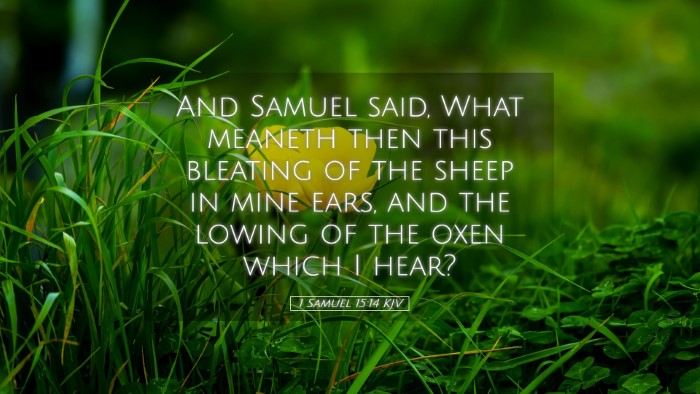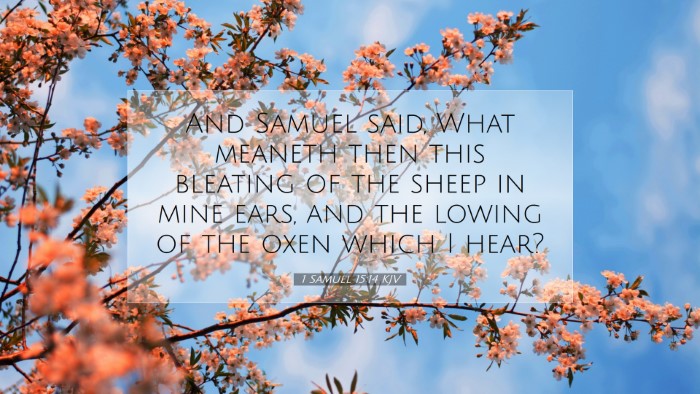Commentary on 1 Samuel 15:14
Verse Context: 1 Samuel 15:14 reads, "And Samuel said, What meaneth then this bleating of the sheep in mine ears, and the lowing of the oxen which I hear?" This question is pivotal for understanding the disobedience of Saul and the gravity of his actions before God.
Introduction
The historical books of the Old Testament, particularly the narratives around the reign of Saul, provide critical insights into the themes of disobedience and divine judgment. 1 Samuel 15 details God's command to Saul regarding the destruction of the Amalekites. However, Saul's failure to execute God's command fully leads to Samuel's confrontation, which is encapsulated in this verse.
Exegesis and Insights
Samuel’s Inquiry
Samuel's question highlights a significant theological point: the essence of true obedience to God. According to Matthew Henry, the "bleating of sheep" signifies that Saul did not comply with the divine instruction fully and instead rationalized his partial obedience to God’s command.
Implications of Sacrifices
Henry elaborates that Saul's intent to keep the best of the animals for sacrifice was misguided. He assumed that bringing sacrifices to God would compensate for his disobedience, which is a common theme in biblical narratives. This echoes the sentiment found in Psalm 51:16-17, that God desires a contrite heart over sacrifices.
The Voice of Conscience
Albert Barnes points out that Saul’s actions could be seen as an attempt to appease both God and the people. In his commentary, he stresses that the "lowing of the oxen" manifest Saul's internal struggle and the unwillingness to confront the reality of his disobedience. His conscience wasn’t fully at peace, indicating the necessity of acknowledging sin rather than evading it.
The Contrast Between Appearance and Reality
Adam Clarke comments on the stark contrast between outward appearances and spiritual reality. Saul might have outwardly expressed a desire to serve God by saving the best animals for sacrifice. However, this act is seen as a veneer that hides the deeper issue of rebellion against God's authority.
Consequences of Disobedience
The inquiry made by Samuel is not merely rhetorical; it calls Saul to account for his actions. Henry emphasizes that Saul's failure to follow God’s command leads to his ultimate rejection as king. This principle of divine judgment based on obedience is foundational to the narrative of Israel's monarchy.
Theological Reflections
In light of Samuel’s question, it’s imperative to draw conclusions applicable to contemporary faith practice:
- The Danger of Partial Obedience: Just as Saul’s partial compliance to God’s directive brought severe consequences, believers today must heed the call for total obedience.
- True Worship Comes from the Heart: The intent behind our actions—forgiveness, offerings, or service—must be sincere and aligned with God’s will.
- God’s Voice Must Prevail: Like Saul, individuals may be led by the pressures of society. However, true fidelity to God necessitates prioritizing His command above cultural expectations.
Conclusion
1 Samuel 15:14 serves as a solemn reminder of the paramount importance of obedience in the life of faith. Samuel’s probing question unveils the human tendency to rationalize sin and highlights God’s desire for hearts that are fully committed to His will. In exploring this passage, scholars, pastors, and students of theology are encouraged to reflect on personal obedience, the sincerity of worship, and the weight of God’s commands in their lives.
Final Thoughts
This verse, while historical, resonates deeply with modern believers. It poses a question relevant to every generation: How do we respond to God's commands? May we strive for rigorous obedience that glorifies God in every aspect of our lives.


